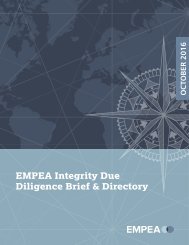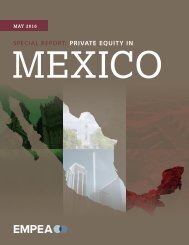Create successful ePaper yourself
Turn your PDF publications into a flip-book with our unique Google optimized e-Paper software.
ather than an onshore centre that is in East Africa. Both are too<br />
far to benefit from proximity benefits, but Mauritius is already<br />
established. For that reason there is some rationale to promote<br />
centres such as Casablanca rather than to look to cities in<br />
East Africa.<br />
When considering the potential <strong>of</strong> African cities to become<br />
major financial centres, it is useful to look at other examples<br />
where certain countries have tried to fulfil this role with mixed<br />
success. Building a financial centre becomes particularly difficult<br />
if you are competing against an already established centre. In<br />
the case <strong>of</strong> mainland Africa, this means competing against<br />
somewhat remote centres such as Dubai and less remote<br />
Mauritius. Their relative lack <strong>of</strong> proximity leaves scope for new<br />
centres to develop.<br />
A good example might be the Middle East. Clearly Dubai has<br />
become an important financial centre, not only servicing the<br />
Middle East but in many cases also hosting companies that<br />
service India and Africa. It has successfully held its position<br />
against active competition from other cities in the region<br />
including Doha, Bahrain, Abu Dhabi and Jeddah. In particular,<br />
Doha and Bahrain have both created financial centres and<br />
there has been an active policy by the governments in those<br />
countries to encourage foreign companies and investors to build<br />
a local presence. Despite pressure from local governments to<br />
tie government contracts to the presence <strong>of</strong> a local <strong>of</strong>fice, in<br />
practice, local <strong>of</strong>fices became something <strong>of</strong> a token gesture<br />
and the local presence was <strong>of</strong>ten a small <strong>of</strong>fice with the main<br />
Middle East presence remaining in Dubai. Similar policies could<br />
be more effective in Africa, in particular West Africa, where<br />
there is no immediate centre to compete against, as was when<br />
Dubai began its effort. Dubai can also serve as example that<br />
limited rule <strong>of</strong> law must not be a barrier to the development <strong>of</strong><br />
a financial centre. International Arbitration can remedy bias <strong>of</strong><br />
local courts.<br />
The BRICS also serve as example that the size <strong>of</strong> the<br />
economy must not be the determinant <strong>of</strong> the location <strong>of</strong> a<br />
regional financial centre—in particular, if there are established<br />
financial centres to compete against. Cities such as Moscow,<br />
Mumbai and Shanghai are now host to a substantial amount<br />
<strong>of</strong> financial activity. But in general they service very large<br />
domestic economies and have so far failed to become a hub for<br />
the region. In the case <strong>of</strong> Mumbai and Shanghai, they will face<br />
competition for the role from the likes <strong>of</strong> Tokyo, Hong Kong and<br />
Singapore. These other centres have a greater history <strong>of</strong> being<br />
important centres for finance and trade and they also have<br />
legal systems and a business environment that is more closely<br />
aligned to international standards. Mumbai and Shanghai are<br />
also evolving out <strong>of</strong> economies that were or still are fairly closed.<br />
Until recently both had capital controls and in both cases the<br />
rule <strong>of</strong> law is viewed with suspicion by international investors.<br />
In the absence <strong>of</strong> competition <strong>of</strong> the likes <strong>of</strong> Hong Kong for<br />
Shanghai in Africa, size could determine the location <strong>of</strong> its<br />
financial centres. Other than Nigeria, no African country has a<br />
sufficiently large domestic market to become a regional financial<br />
centre in its own right. One could argue that Johannesburg should<br />
be a natural onshore financial centre given its infrastructure and<br />
sophistication. But the historical political problems and more<br />
specifically the difficulties created by capital controls have<br />
meant that it has failed to fulfil its potential. Any other country<br />
would need to act as a wider regional centre covering multiple<br />
African geographies. Kenya in East Africa stands out in terms<br />
<strong>of</strong> market development, infrastructure, quality <strong>of</strong> life and overall<br />
human capital. French speaking West Africa is large enough to<br />
support its own financial centre.<br />
An important lesson for Africa is that in the absence <strong>of</strong> a<br />
financial centre, without the political will to establish one,<br />
it is unlikely to emerge by itself as illustrated by Moscow.<br />
In the case <strong>of</strong> Moscow, there remain many issues<br />
including political stability, the rule <strong>of</strong> law and the quality<br />
<strong>of</strong> infrastructure. Theoretically, Moscow could be a centre<br />
that serviced several important regions such as Central<br />
Europe and countries from the former Soviet Union. But the<br />
Russian administration seems to have little interest in this.<br />
7. THE ROLE OF DONORS<br />
As donors seek new and innovative ways in which to<br />
catalyse development, they are keen to understand the<br />
benefits that may accrue from building financial centres.<br />
As a starting point, this means that donors are willing to<br />
accept the benefits <strong>of</strong> financial markets in development.<br />
Indeed many donors and development banks are keen to<br />
promote capital markets development in African countries.<br />
The IFC and African Development Bank are both very<br />
active in working with African countries in promoting the<br />
development <strong>of</strong> local stock exchanges, in endorsing<br />
domestic bond markets and in helping African countries<br />
access the latest financial products from the international<br />
markets. Both <strong>of</strong> these issuers have executed bond<br />
transactions in domestic African markets in order to promote<br />
liquidity and to catalyse the development <strong>of</strong> the institutional<br />
<strong>Conduits</strong> <strong>of</strong> <strong>Capital</strong> – Onshore Financial Centres and Their Relevance to African Private Equity<br />
| 111





